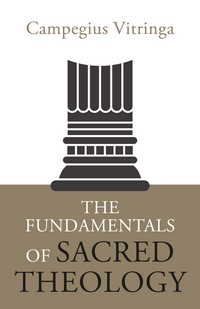 The Fundamentals of Sacred Theology
The Fundamentals of Sacred Theology
by Campegius Vitringa, Sr., Levi Berntson (Translator)
DETAILS: Publisher: Reformation Heritage Books Publication Date: September 2, 2024 Format: Paperback Length: 235 pg. Read Date: December 1-8, 2024

What’s The Fundamentals of Sacred Theology About?
The original (Latin) title of this is Aphorisms which Comprehend the Fundamentals of Sound Theology—and that’s a decent summary of this work. In 1,000 points—mostly a sentence or two, a few are a good-sized paragraph—Vitringa lays out a fairly comprehensive outline of Systematic Theology. For his students, this is basically a course outline for them to fill out by their own research and showing up for class.
In his Prologue, he says:
What use do you say that this little book is for us? For this, listeners, first, that you may have a certain order by which I discuss the matters of theology, and second, that I may explain the collected fundamentals of these things clearly and truthfully. Thus, in this brief space of time, you would be able to repeat this sum of all truths as handed down to me and memorize them.
Interestingly (for his contemporary readers as well as his 21st Century readers):
I did not wish to add Scripture references so that I would compel and persuade you against your will to consult other authors. For I know that no one is frightened by excessive brevity.
* I love this sentence and sentiment. I can’t help but notice a lot of Reformation and post-Reformation writers say something along these lines. Vitringa is the only one I recall seeing living by it, however. I doff my cap to him.
Here’s a summary of the work as a whole from the man himself:
First, I have set forth very brief theses which lack necessary explanation. Second, I have refrained from adding Scripture references which ought to be employed for confirming them. There were friends whose judgment I greatly trust who dissuaded me from both of these points. But I have most serious reasons why I did not comply with them. For if these theses were greatly lengthened, this book would grow into a system. But I determined in my soul that I would never write a full dogmatic work, since certain ones have been published by most learned men in this day and age which are quite to my taste.
Now, I’ve had some pretty thorough and useful syllabi in my academic life, but to be given a document that’s essentially: Here’s everything you need to know, go fill in the details. I love this idea—and I think that this is a dream come true for theology students, grab this and fill it out.
So, what did I think about The Fundamentals of Sacred Theology?
I was a little annoyed when I saw Keith Mathison write:
Imagine if someone summarized the substance of Reformed doctrine in 1000 tweets. Vitringa already did it.
Because I was pretty much going to say that myself. True, it’s hard not to say something like that about this book in this day and age, but, still.
The aphorisms, fundamentals, or tweets that are the very format of this book are also its weakness. There are so many times that I wanted a little more detail, a little more explanation, that I just wasn’t going to get. Generally, it was to make sure I understood what he was getting at—I was pretty sure, but another sentence or two would’ve helped. On a few points I really didn’t understand what he was getting at or where he was coming from (usually, I was intrigued by the notion, but I needed more).
But by and large, these brief points are a great way to do a quick study, refresher, or introduction of a topic in systematic theology. And you can use the points as the basis for your own outline to fill in the details with your own study (just like Vitringa intended).
Is it the greatest thing I’ve read when it comes to systematics? Nope. But it’s possibly the quickest, (deceptively) easiest systematic read I’ve come across. It’s a useful and generally helpful read and something I can see myself returning to often. Give it a shot.

This post contains an affiliate link. If you purchase from it, I will get a small commission at no additional cost to you. As always, the opinions expressed are my own.
![]()



1 Pingback